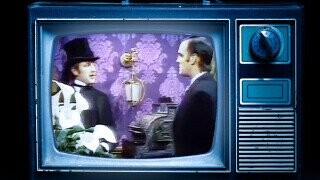Monty Python Controversies That Were Actually Real

Monty Python has never been more controversial than they are today — after all, one of the group’s most famous members wasn’t even allowed to speak at a scheduled university event, and the BBC is outright refusing to re-air their work. On the other hand, both of those scandals only exist inside John Cleese’s head; he self-canceled his own gig in 2021 and somehow forgot that the Pythons sold their entire catalog to Netflix in 2018 in a highly-publicized and presumably lucrative deal, which obviously prevents it from appearing on the BBC.
While the comedy legend has repeatedly complained that joke-telling is more difficult in the 21st century because people are too “uptight” and “woke,” that's an especially odd position to take considering that Monty Python has sparked a number of controversies — but unless our calculations are off, they mostly occurred literal decades ago. Like how…
The BBC Forced the Pythons to Add Boos to the Undertaker Sketch
Don't Miss
Although not as beloved as, say, the Dead Parrot sketch, or, well, most of their other sketches, the undertaker routine from the second season of Monty Python's Flying Circus found Graham Chapman as an uncouth mortician who suggests cannibalizing Cleese’s mother — not raw of course.
In the original broadcast version, the sketch is interrupted by the sounds of the audience revolting, booing the performers for the tasteless jokes, before eventually rushing the stage in a mad frenzy. Clearly, Cleese and Chapman (who wrote the sketch together) were trying to be provocative; when they first brought the material to the rest of the Pythons, only Terry Gilliam found it funny, while the others were "shocked."
The BBC’s Head of Comedy allowed it to be filmed on the condition that “the audience was shown to register its disapproval by taking over the set.” The day after the episode aired, the BBC held a meeting, and, shockingly, they weren’t big fans of the corpse-eating content. The BBC brass discussed how the show was “continually going over the edge of what was acceptable” and that the “team seemed to wallow in the sadism of their humor,” citing the “appalling” undertaker sketch as evidence of how the series had become “nihilistic and cruel.”
The Pythons WerenMonty Python’s recording career was no less fraught with annoying complaints; when they released Monty Python's Contractual Obligation Album, the Independent Television Companies Association prevented their label, Charisma, from advertising it on TV — not because of the content of the commercials, but because the Pythons were "crude in the extreme." Of course, the label ended up using this specific criticism as a slogan in the print ads.
They also jokingly added a tag reading: “Now a Major Lawsuit,” which soon became less funny for the company when the album was nearly the subject of an actual major lawsuit. One of the tracks, “Farewell to John Denver,” featured a brief clip from the John Denver tune “Annie’s Song,” followed by the sounds of him being violently strangled.
Denver’s reps threatened to sue the Pythons for “breach of copyright and defamation,” so the track was pulled and replaced with an announcement from Terry Jones describing how a sketch had been removed due to “legal advice.”
ABC Edited ‘Flying Circus’ Episodes Without Permission
When ABC got the rights to six Flying Circus episodes in the 1970s, they decided to edit them into 90-minute specials — but in doing so, they substantially edited the programs, cutting out around 20 minutes. They did this not just for time but because the network was extremely concerned about the naked women, "homosexual references" and a scene in which a waiter "touched a … patron's buttocks."
When the Pythons found out that an American network was censoring their shows, they responded to the “mutilation” of their artistic output by taking ABC to court in order to prevent any further airings. At one point, the judge told the group: “I thought that was your business, being fools.” To which Michael Palin replied: “Well, on our own terms.”
‘Life of Brian’ Was Straight-Up Banned in Several Countries
Monty Python’s most notorious controversy was the release of Life of Brian, which was criticized for being “blasphemous” upon its release in 1979. And, to be fair, the film did begin with a bunch of "bad-taste" jokes about Jesus. Despite the fact that the Python’s film ultimately side-stepped ridiculing Christ in favor of lampooning the farcical politics of organized religion, it was straight-up banned in countries like Ireland and Norway.
In countries where it was released, there were significant protests. The President of the Rabbinical Alliance of America claimed that the film was “produced in Hell” and noted racist piece of shit Senator Strom Thurmond used his power to cancel Life of Brian's release in South Carolina, which then sparked a counter-protest, with angry Python fans carrying signs depicting slogans such as "Resurrect Brian, Crucify Censors" and "Strom Doesn't Pay for My Movie Ticket."
News of the controversy was such a big deal that Cleese and Palin went on a BBC talk show in order to heatedly debate the issue with Roman Catholic journalist Malcolm Muggeridge and the Bishop of Southwark, Mervyn Stockwood.
Despite the bans, the controversy increased the number of screens the film played on, prompting Cleese to later suggest that those who were enraged about Life of Brian “have actually made me rich.”
You (yes, you) should follow JM on Twitter (if it still exists by the time you’re reading this).